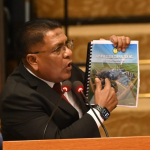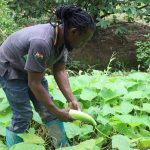A team of Dutch engineering students is here to work with local agencies for the modelling of an effective and efficient drainage system for the city of Georgetown.
Government agencies identified to work along with the team which is here as a follow -up to a visit made in 2015 by the Dutch Disaster Risk Management Team are the Ministries of Agriculture and Public Infrastructure, National Drainage and Irrigation Authority (NDIA), Mayor and City Council of Georgetown (M&CC), University of Guyana (UG), the National Task Force, and the Civil Defence Commission (CDC).

The Netherlands’ Dutch Risk Reduction, (DRR)-Team at the commencement ceremony of the Georgetown Drainage Project
The team comprises students undergoing studies which will lead to their Masters in Hydraulic Engineering. They will spend approximately seven weeks.
Minister of Public Infrastructure, David Patterson while addressing the audience at the Commencement Ceremony of the Georgetown Drainage Project by the Dutch Risk Reduction team (DRR) in the Ministry of Agriculture’s Boardroom explained that when the team visited early in January, they recommended that Guyana use a proactive approach to respond to flood- related issues.
The Minister further explained that the DRR team reported that Guyana’s response to flood-related problems has often been reactive rather than a crisis driven approach, therefore shifting to a more proactive approach means, “that we have to shift from crisis to a more long- term planning in the construction, as well as maintenance of our drainage infrastructure.”
The DRR team also recommended that Guyana upgrade its hydraulic model capabilities. Based on this, the DRR team will develop the model, as well as train and work along with the local engineers to replicate it countrywide, Minister Patterson explained.

Minister of Public Infrastructure, David Patterson delivering remarks at the commencement ceremony of the Georgetown Drainage Project
Guyana’s drainage system has been operating primarily on historic knowledge from the operators. This approach, Minister Patterson pointed out makes the drainage system unsafe as well as inefficient, thereby resulting in human error. “While we value the experience of our staff we believe that modernisation is vital in order for us to improve our drainage system” Minister Patterson noted.
Over the last few months technical information was garnered including the Georgetown Water and Sewerage Master plan, maps showing catchment areas of Georgetown drainage and a report prepared by the Ministry of Agriculture following the 2015 flood which was shared with the DRR team to prepare the drainage model with accurate information.
According to Minister of Agriculture, Noel Holder for Guyana, a country of 83000 square miles with about 80 percent of its population living on the coastland which is largely below sea level, drainage is a serious problem especially because the coast is where most of the agricultural production takes place. “In that context, this is how very important drainage and irrigation is,” the minister said.
The Minister of Agriculture extended a warm welcome to the DRR team and wished them success in the execution and completion of the intended project to create an efficient and effective drainage model for the city.
“As you embark on your three-month stay to complete your respective Masters programme, it is our hope that your desired outcomes are met especially since you have been given the important task to assist in the development of a new pilot system and design model to improve the drainage and irrigation system in the city of Georgetown. It is within this context that we at the Ministry of Agriculture consider ourselves privileged to be partners with the Minister of Public Infrastructure, the city of Georgetown, the University of Guyana and the Disaster Risk Management team in execution of this important project,” said the Agriculture Minister.

Minister of Agriculture Noel Holder delivering remarks at the commencement ceremony of the Georgetown Drainage Project
Minister Holder pointed out that the project is timely, “considering the global focus on disaster risk reduction and management. “We express profound gratitude to the Kingdom of the Netherlands for the provision of the technical expertise for the execution of this and other initiatives.”
Addressing representatives of the local agencies present at the commencement ceremony, Minister Holder said, “It’s good to know that many local participants are involved in working along with the DRR team.”
He said the local engineers assigned to work along with the team should make the most of the opportunity to build their knowledge based on hydraulic drainage models and “be trail blazers in this field and be able to replicate same.”
The representatives were further encouraged by the Minister to “leverage the opportunity given and learn from the expertise of your colleagues so that you will be able to operate more efficiently and effectively on returning to your respective organisations, and transfer what you have learnt to support the work to be done in drainage and irrigation.”
The Agriculture Minister said that the expertise developed through this collaborative effort will enable the government to provide better drainage to citizens and it is expected that rapid replication of systems and processes learnt will take place.
Stressing the importance of the National Drainage and Irrigation Authority (NDIA) the Minister said, “Water management is a critical area of focus to the Ministry of Agriculture since we need to be able to adapt to climatic change where our water resources and management is concerned.”
The Minister identified an efficiently managed water system as having a, “positive impact on agriculture” since its benefits include salinity control, prevention of flooding, prevention of soil erosion and water supply among others.
Meanwhile, the National Task Force Secretariat, since assuming office, played a key role in addressing drainage and other issues in the country. The department has since visited every region in the country and compiled a list of the major issues affecting the regions.
“That list is what drives my ministry to do my budgetary provision and intervention, it’s not only drainage, it’s solid waste management, the question of vagrants, traffic management, there’s a holistic approach,” Minister Patterson explained.





